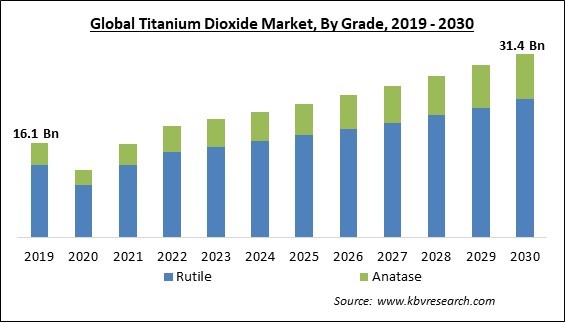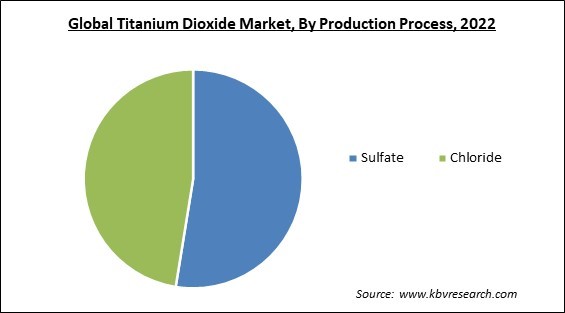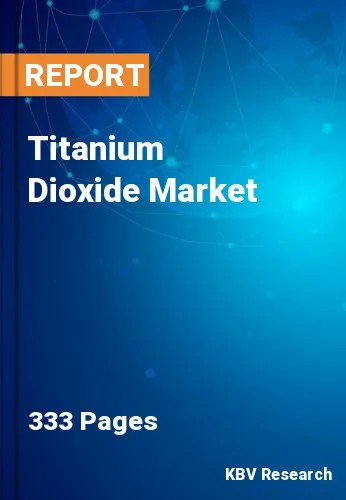The Global Titanium Dioxide Market size is expected to reach $31.4 billion by 2030, rising at a market growth of 6.4% CAGR during the forecast period. In the year 2022, the market attained a volume of 6,247.4 Kilo Tonnes, experiencing a growth of 5.8% (2019-2022).
TiO2 is used as a filler in the production of pulp and paper, making the pulp and paper industry one of the leading end users of the material. Therefore, the Pulp & Paper segment generated $1,443.4 million revenue in the market in 2022. The product makes the paper more vibrant, opaque, colorful, porosity-free, smooth, glossy, and printable. The substance is widely used in creating magazine papers, decor, and decorative foils for various printing applications. Some of the factors impacting the market are thriving construction industry with rise in demand for paints & coatings, increase in demand for lightweight vehicles, and strict environmental policies of governments.

The expansion of the building industry, which comprises residential and non-residential infrastructure, is one of the key factors boosting demand for paints and coatings. Titanium dioxide improves color fading, chalking, and crack resistance in paints and varnishes for exterior surfaces. It also has photocatalytic activity, which enables self-cleaning and provides protection from germs, algae, fungi, and contaminants. Rapid urban and industrialization, rising purchasing power parity (PPP), a high standard of life, and a rise in disposable income are some factors that have contributed to the growth of the construction industry, which has, in turn, fuelled the development of the market. As automakers use more plastics in vehicle interiors and exteriors, the demand for TiO2 in plastic applications is likely to increase. Several plastic-based auto parts, including the bumper, the interior, and the exterior, are coated with titanium dioxide. Moreover, lightweight vehicles often use advanced materials, including aluminum and composite materials, to reduce weight while maintaining strength and durability. These materials are typically coated with high-quality paints and coatings to protect them from environmental factors and enhance their appearance. In conclusion, the increased demand for lightweight vehicles has the potential to drive the market.
However, most manufacturing facilities use sulfate to create titanium dioxide and discharge a significant volume of sulphuric acid into the ocean. Titanium dioxide has a negative impact on the environment because of its corrosive properties and improper disposal. To prevent the discharge of waste produced while manufacturing titanium dioxide into rivers or the ocean and to integrate programs that limit wastewater discharge, the governments of China and Europe have implemented environmental rules. These rules restrict the production of titanium dioxide in numerous places, affecting the market's expansion.
On the basis of production process, the market is categorised into sulfate and chloride. In 2022, the chloride segment witnessed a significant revenue share in the market. The chloride process has several benefits, including quick processing, simple capacity expansion, high automation, comparatively low energy consumption, low waste output, and the creation of higher-quality goods. As a result, producers use this procedure to speed up the processing and enhance TiO2 production.

Based on grade, the market is divided into rutile and anatase. In 2022, the rutile segment acquired the highest revenue share in the market. The primary raw material for titanium dioxide is rutile. Metamorphic, sedimentary, and igneous rocks all contain rutile. Rutile is used extensively as pigments and to make titanium metal. In paint applications, rutile grade TiO2 is utilized as a carrier to provide white color in plastics and stop color fading in paper. Demand for rutile grade TiO2 is expected to increase due to the expanding construction sector.
By application, the market is categorized into paints & coatings, plastics, pulp & paper, cosmetics, and others. In 2022, the paints & coatings segment generated the maximum revenue share in the market. When used in coatings, titanium dioxide has highly effective visible light scattering properties that add whiteness, brightness, and opacity. The significant growth in the automotive and construction industries has mainly driven up demand in the paints and coatings sector. The rise in demand for home improvement and interior design fuels a surge in demand for decorative paints and coatings and, in turn, propels the market.
| Report Attribute | Details |
|---|---|
| Market size value in 2022 | USD 19.1 Billion |
| Market size forecast in 2030 | USD 31.4 Billion |
| Base Year | 2022 |
| Historical Period | 2019 to 2021 |
| Forecast Period | 2023 to 2030 |
| Revenue Growth Rate | CAGR of 6.4% from 2023 to 2030 |
| Number of Pages | 333 |
| Number of Table | 690 |
| Quantitative Data | Volume in Kilo Tonnes, Revenue in USD million, and CAGR from 2019 to 2030 |
| Report coverage | Market Trends, Revenue Estimation and Forecast, Segmentation Analysis, Regional and Country Breakdown, Companies Strategic Developments, Company Profiling |
| Segments covered | Grade, Production Process, Application, Region |
| Country scope | US, Canada, Mexico, Germany, UK, France, Russia, Netherlands, Italy, China, Japan, India, South Korea, Australia, Indonesia, Brazil, Argentina, UAE, Saudi Arabia, South Africa, Nigeria |
| Growth Drivers |
|
| Restraints |
|
Region-wise, the market is analysed across North America, Europe, Asia Pacific, and LAMEA. In 2022, the Asia Pacific segment attained the highest revenue share in the market. The increasing construction activity in China, India, and other Southeast Asian nations is responsible for the region's increased need for paints and coatings, which is expected to boost the market further. The demand for titanium dioxide in Asia Pacific has expanded due to recent economic growth and fast industrialization.
Free Valuable Insights: Global Titanium Dioxide Market size to reach USD 31.4 Billion by 2030
The market research report covers the analysis of key stake holders of the market. Key companies profiled in the report include Kronos Worldwide, Inc., The Chemours Company, Tronox Holdings Plc, Evonik Industries AG (RAG-Stiftung), LB Group, Venator Materials PLC, Ishihara Sangyo Kaisha, Ltd., TAYCA Corporation, CATHAY INDUSTRIES, and TOR Minerals International, Inc.
By Grade (Volume, Kilo Tonnes, USD Million, 2019-2030)
By Production Process (Volume, Kilo Tonnes, USD Million, 2019-2030)
By Application (Volume, Kilo Tonnes, USD Million, 2019-2030)
By Geography (Volume, Kilo Tonnes, USD Million, 2019-2030)
This Market size is expected to reach $31.4 billion by 2030.
Thriving construction industry with rise in demand for paints & coatings are driving the Market in coming years, however, Strict environmental policies of governments restraints the growth of the Market.
Kronos Worldwide, Inc., The Chemours Company, Tronox Holdings Plc, Evonik Industries AG (RAG-Stiftung), LB Group, Venator Materials PLC, Ishihara Sangyo Kaisha, Ltd., TAYCA Corporation, CATHAY INDUSTRIES, and TOR Minerals International, Inc.
In the year 2022, the market attained a volume of 6,247.4 Kilo Tonnes, experiencing a growth of 5.8% (2019-2022).
The Plastics segment has shown the high growth rate of 6.2% during (2023 - 2030).
The Asia Pacific region dominated the Market, By Region in 2022, and would continue to be a dominant market till 2030; thereby, achieving a market value of $13.2 billion by 2030.
Our team of dedicated experts can provide you with attractive expansion opportunities for your business.

